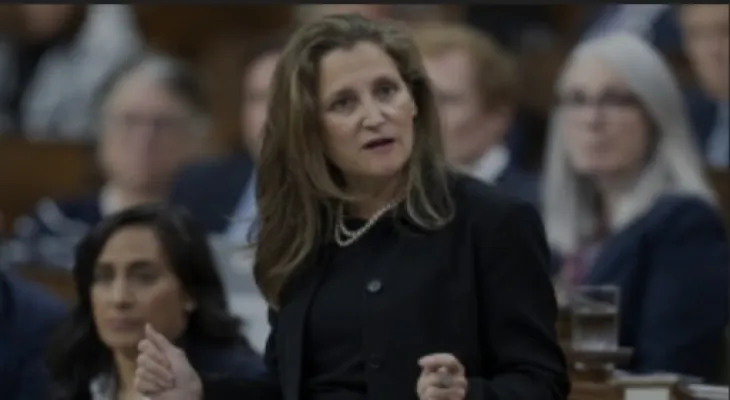Search here
Newspaper
Search here

Arab Canada News
News

Published: November 3, 2022
Finance Minister Chrystia Freeland is scheduled to present her mid-year budget update in the House of Commons today with a strong focus on pushing investment into clean energy industries in Canada in response to the new U.S. tax incentives signed into law last summer. The government will already be spending more financially than expected as inflation and a stronger economic recovery have increased tax revenues. But after years of costly COVID-19 relief packages, Freeland is retreating to what the government believes is a fiscal stance justified by the need to reduce the deficit and prepare for a potential economic recession in 2023.
Also, Rachel Bendayan, the Liberal MP from Montreal and Parliamentary Secretary to the Assistant Finance Minister, said: "Obviously, I won’t preempt the Finance Minister, but it will be an economic fall statement that will ensure fiscal responsibility." Freeland is not expected to do more to help Canadians get through the cost-of-living crisis, as in September, $4.5 billion was offered to temporarily double goods and services tax credits, establish a dental care benefit for most children under 12, and provide a one-time $500 increase to low-income renters’ allowance.
Also, the goods and services tax benefits will start to be felt on Friday as deposits begin to reach the bank accounts of 11 million low- and middle-income families. The legislation to create dental compensations and increase housing allowances is still before the Senate. The government also indicated that the mini-budget would be very small and focus on targeted investments rather than broad new programs. It will include a new tax on corporate stock buybacks to encourage companies to invest in their operations and offer new or enhanced tax incentives to help grow clean energy including hydrogen.
Both are part of the Inflation Reduction Act negotiated by President Joe Biden and signed into law in August. Industry owners have repeatedly warned the government that Canada needs to keep pace with the U.S. or investment will flee south and put Canadians out of work. In addition, the law includes nearly $400 billion in tax incentives, grants, and loan guarantees for clean energy sectors including electricity production, electric vehicles, and battery manufacturing. It also includes a one percent tax on corporate stock buybacks, which Freeland is expected to reflect in today’s update. This does not rise to the level of the surprise tax that the New Democratic Party wants Ottawa to impose on companies they say are getting richer at the expense of Canadian families.
In the same context, Matt Bourie, senior policy and government relations director for Canadian Manufacturers and Exporters, told a House of Commons committee on Tuesday that the U.S. Inflation Reduction Act sends flashing red warning lights across the Canadian manufacturing sector, adding that Canada’s response in the fall economic statement should include matching programs on this side of the border or "at least a signal to industry that reform is on the way." Innovation Minister François-Philippe Champagne said on Wednesday that the government is on top of it as he told reporters after a Liberal caucus meeting: "We will remain competitive, we know that the U.S. Inflation Reduction Act and the CHIPS Act are incentives for us to do more." The CHIPS Act, signed into law in August, provides $280 billion U.S. to stimulate domestic semiconductor research and manufacturing.
On the other hand, the Liberals have faced criticism for continuing pandemic spending longer than necessary, likely leading to increased inflation. At the same time, Canada’s strong economic recovery from the COVID-19 recession is partly attributed to the financial response. The Conservatives also led the charge against the Liberals for overspending, but the Liberal party is also showing signs of concern. Former parliamentary budget officer Kevin Page said he expects the fall economic statement to be a traditional mid-year update, but it could also be an opportunity for Ottawa to review its spending targets and rules.
Comments